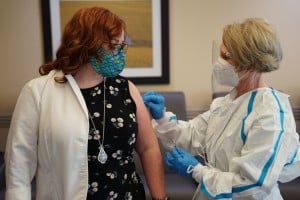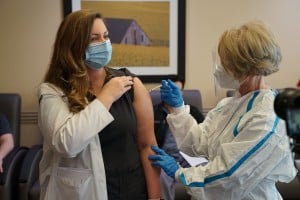As Regional One Health frontline providers receive their COVID-19 vaccinations, they’re talking about why it is important to them to take this step.
Our team members say they see the vaccine as another tool to protect themselves and their families and allow them to continue to be there for patients.
They encourage others to get the vaccine as well, noting it is safe and effective and the best way to control the pandemic and get life back to normal.
For Regional One Health frontline providers, the decision to get the COVID-19 vaccine is both professional and personal.
After months of treating patients – and in some cases losing loved ones to the virus – they are eager to protect themselves so they can continue to be there for those in need. They say the vaccines, which have been rigorously tested and found by experts to be safe and effective, are the best tool we have to control the pandemic and help get life back to normal.
COVID-19 Unit Nursing Director Macy Wade, MSN, RN, NEA-BC, had her own family and her patients’ families on her mind as she got her first dose of the vaccine in December.
“My grandfather passed away on our COVID-19 unit, and I was at his bedside when respiratory therapy removed his breathing tube,” she said. “During his stay, Papaw told me he wondered why he was blessed to live so many years when so many people die young.”

Nursing Director Macy Wade lost her grandfather to COVID-19. She received the vaccine to honor him and so she can help prevent other families from losing a loved one.
“I received the vaccine to honor him and so another 93-year-old man can survive this pandemic because people like me were vaccinated and able to be there to protect people like him.”
Nurse Manager Angelita Rodgers has also experienced personal loss due to the virus, and said she sees it as her responsibility – both to her family and patients – to get vaccinated to promote safety.
“It was important to me to get the vaccine because as a mother, daughter and wife I have a duty to protect my family. As a nurse, I have a duty to protect the public,” she said. “I’ve seen what COVID has done to patients and I’ve experienced the loss of one of my close friends to COVID, she was only 39. The risk of minor side effects from this vaccine is well worth the protection of my family and my community. It was my duty to make this sacrifice.”
Nursing Director Charles Lapsley was guided by his faith and love of family as he received the vaccine.
“My decision was guided by my faith in God,” Lapsley said. “My parents are 76 and 80 and I believe the benefit outweighed any associated or known risk. I feel that God provides us with the intelligence and the tools required for our survival. Faith with no works is dead, and getting the vaccination was my work that goes along with my faith.”
Amber Thacker, MD, director of our COVID-19 unit, based her decision to get vaccinated on the scientific data and her own experience providing treatment.
“These vaccines represent hope to me. We have hope they will work as effectively as the data shows so far, and if they do, this pandemic could potentially be ended years earlier than if left unchecked,” she said. “The alternative is this pandemic continues and lives continue to be lost.”
The stakes couldn’t be higher, said Dr. Thacker. “In addition to deaths, there are harder to measure costs. Children are missing out on social interactions and education. Rates of alcohol and drug abuse are increasing. Suicides and drug overdose deaths are at all-time highs. We are forced to be more sedentary, which will no doubt lead to long-term negative health effects. People are losing jobs and homes.”
Getting the vaccine will keep people safe from coronavirus, she said, which paves the way for a return to normal life.

Dr. Amber Thacker has seen firsthand how devastating COVID-19 can be for patients. She says the risk from the virus is enormous while any risk associated with the vaccine is very small.
Regional One Health President and CEO Reginald Coopwood, MD hopes vaccinating health care workers will serve as a turning point. “This marks the first time we finally have something more than wearing masks and social distancing to fight this virus,” he said. “Our intention is to put a vaccine in every willing arm.”
The frontline providers who received the first doses last month say they are feeling great: the only side effects reported were arm soreness that went away after about 24 hours and minor itching at the injection site. Now, they’re eager to get their second dose to achieve maximum protection of around 95 percent.
As Dr. Thacker noted, “I am confident that the risk of the vaccine is very small and the risk of natural infection with the virus is much larger.”
Wade also wants to reassure others that getting the vaccine is both safe and important. She hopes it can spare others the pain her family experienced when her grandfather died.
“Don’t wait until you’re in the hospital struggling for every breath or receiving a phone call about your loved one passing away. Make the choice to be vaccinated so the story of my family never becomes one that we share,” she said. “If you don’t know someone that has died from COVID-19, you are lucky. If you have, I hurt alongside you every day.”
For more information about COVID-19, visit regionalonehealth.org/coronavirus